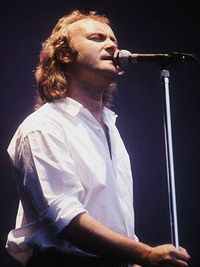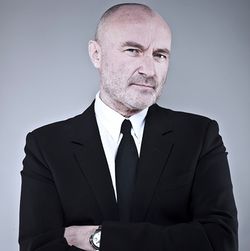Phil Collins
Philip David Charles Albert Randolph George Anthony Roger Lucille Uranus Robert Ernest Joseph Maximilian "Phil" Collins, LVO (born 30 January 1951) is an English musician, '80s icon, and human schmaltz factory. He gained fame as the drummer, lead singer, frontman, and bank account manager of pop rock band Genesis in the 1980s, in addition to a solo career of multiple hit singles. Peter Gabriel? Who's that?
Collins came to Genesis in 1970, when they were but a mere prat-rock band. In 1975, when Gabriel left the group to play with plasticine because a voice on a hill had instructed him to do so, Collins assumed his position as frontman and took the band in a bold new direction. He remained in the band until 1996, when he found a large burning cross on his front lawn, with a message from a prog diehard crudely carved into his door threatening that he leave Genesis.
Early life and acting career[edit | edit source]
Collins was born in 1951 in Chiswick, London. A moody, introspective loner in his younger days, Phil was plagued since childhood by a dream unrealized: all he ever wanted to be was a movie star. "Ever since his first film, he's had the acting bug," his mother has said. "Ach, Calamity," she sighed. Indeed, Calamity the Cow, Collins's first and only starring role, proved to have a prophetic title. Collins argued passionately with the director of the film about the direction it should take, and some of his best, improvised scenes were cut from the final version of the film by wicked movie executives.
Collins's friends swept him up into the music industry to try to assuage his deep-seated disappointment after his part in the Beatles film A Hard Day's Night was cut down to one split-second scene in which he appears as the seventeenth maniacal fan from the left, in the back row.
Musical career[edit | edit source]
Genesis[edit | edit source]
In 1970, Collins was hired as the not-upper class drummer for the upper-class progressive rock group Genesis. This came during a rough period in Collins's life, when frontman Peter Gabriel found him drumming on garbage cans on a street corner outside his favourite pub. Gabriel was then told by a trusted source that Collins had been sent from heaven to absolve all drummers. Collins, who by this time was well-known around London as a drumming messiah and a successful economist, was down on his luck. Gabriel invited Collins to come play drums and sing some vocals for his band Genesis.
At this point Genesis were wearing utterly ridiculous stage outfits, to the point where John Lennon began referring to Collins as 'The ringpiece in the codpiece'. This, however, would prove to be Gabriel's biggest mistake. Collins' percussion and vocals added so much to Genesis' sound that they eventually exploded.
Initially, Genesis specialized in tedious, pretentious prog rock songs that ran for 38 minutes and dealt with social issues like suppertime and the world of Puerto Rican Broadway. It wasn't until Peter Gabriel left the group that they reached international fame. Under Collins' rhythmic leadership, the band abandoned their prog-rock leaning-on-a-bar leanings, and moved towards writing pop rock music that was actually enjoyable to listen to.
Solo career[edit | edit source]

As a solo artist in the 1980s, Collins scored a number of hit singles. In interviews, Collins later admitted that his fervent drug experimentation during this era was the inspiration for these hits and their mystical, obscure lyrics and complex, odd time signatures. The story of this hectic period in Collins' life could best be told by the trail of one-night lovers and peeved hotel managers he left in his wake. Few performers have been able to imbibe so much alcohol and still be able to function enough to (nearly) reproduce the complex drum solo of his hit single "In the Air Tonight". Throughout the 1980s, you couldn't go anywhere without hearing Collins's music, be it on the radio, in cop dramas, music videos, or beer commercials.
Collins was also part of Live 8. On one day in 1985, he flew to three different continents on a Concorde to prove once again that he is the coolest person on earth. He even sang and played drums for some people who were just standing in the parking lot, without ever being asked. The sponsors were quoted as saying that they ended up spending more money on gas for flying Collins around the globe than he actually helped raise for impoverished Africa.
During this period, Collins not only worked as a musician, but also picked up a weekly paycheck as a Physics professor at Harvard. Between Genesis gigs in 1982 he discovered the secret to cold fusion. "You can tell from his drumming how mathematical his mind is," Mike Rutherford said in a magazine article at the time. "It's all sequential and time based." As the 1980s wore on, Collins devoted more and more of his time to quantum physics, in the hope of discovering the one theory that would link together existing scientific laws and unlock the key to the universe. "I'm also working on a new album," Collins added sheepishly in a 1986 Rolling Stone article about his scientific achievements. Collins wrote over 500 papers and claimed seven honorary degrees from seven different universities. He was quoted as saying that he hoped to some day journey through a black hole, "like in that song by Rush."
During the 1980s, there was much criticism charging Genesis's shift from lengthy, complex prog epics to commercialized, radio-friendly "sell-out" material. Fans of the band blamed Collins for their change in direction, disillusioned with his shallow prating, schmaltzy pop songs, and irresponsible, shameless flights of uninhibition — a far cry from the old days when he was a moody, introspective loner. "If the choice is between being singing pop songs or dressing as a fucking sunflower singing shit about dungeons and dragons, I'll take poppy any damn day of the week," said Collins in a Rolling Stone interview, responding to this criticism in a veiled reference to his former bandmate's eccentric past.
Downfall[edit | edit source]
Sadly, while Collins couldn't hurry love, he could hurry his descent into obscurity. Upon his 7th divorce in 6 years, in 1990 Phil released his single "Another Day Of Divorce Advice." The single was instantly condemned by the catholic church, and Collins' mansion was instantly mobbed, burnt, and toilet papered by an angry crowd of soccer moms. Luckily, his collection of Alamo memorabilia survived, but unfortunately, his to-full-scale model train set did not. In order to recoup his cost and to pay for a new model train set, Collins released his new album "Both Times I Wasn't Richer Than Everybody", a concept album about his massive amounts of wealth that he enjoyed swimming in during his visits to his Swiss bank vaults. The album failed to make an impact, although it was notably a favorite of Warren Buffett's.
Collins next reportedly attempted to regain his lost popularity by putting actual instruments onto his next album, according to several interviews with him. It is sadly unknown what the name of this album was, as it was the first album ever to sell negative copies. Though the album has since been lost to time, some reviews still exist which paint an expected image of the album.
“This album is boring. All the drums suck. My wife could make better music.”
“This sounds like Peter Gabriel but worse.”
“This album is a bunch of poopy fuck turds! I'd rather fuck my ex-wife than listen to this shit!”
Comeback[edit | edit source]
In 2010, Collins released an album of cover versions of Motown hits. Remarkably this was a hit so Collins got some attention again.
In 2011, Collins then declared his retirement from music; however, this announcement did not get him any more attention. In 2015, he announced that he was coming out of retirement to write more cheesy-yet-endearing pop hits.
In conclusion, did anybody give a fuck that he drowned?[edit | edit source]
No.
Discography[edit | edit source]
Albums[edit | edit source]
- Tesco Value Face (1981)
- Hello, You Must Be Göring! (1982)
- No Trousers Required (1985)
- Dingleberries Down My Throat (1987)
- But Seriously (I'm Not Putting Out Another Album) (1990)
Singles[edit | edit source]
- "In the Arse Tonight" (1982)
- "In Soviet Russia, Love Can't Hurry YOU!" (1982)
- "Sleazy Lover" (1984)
- "Against All Odds (People Bought This)" (1984)
- "Nobody Cares Anymore" (1984)
- "One More Shite" (1985)
- "(Can Security Please Escort My Estranged Wife Out The) Stu-Stu-Studio" (1985)
- "You Will Probably Lose My Number" (1985)
- "Separate Wives" (1986)
- "A Groovy Kind Of Widow's Peak" (1988)
- "Two Hearts" (1988; also Phil's best poker hand ever)

